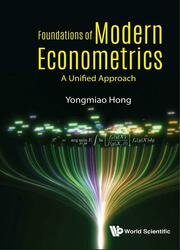Foundations Of Modern Econometrics: A Unified Approach
- Добавил: literator
- Дата: 24-08-2021, 20:50
- Комментариев: 0
 Название: Foundations Of Modern Econometrics: A Unified Approach
Название: Foundations Of Modern Econometrics: A Unified ApproachАвтор: Yongmiao Hong
Издательство: World Scientific Publishing
Год: 2020
Страниц: 523
Язык: английский
Формат: pdf (true)
Размер: 13.1 MB
Modern economies are full of uncertainties and risk. Economics studies resource allocations in an uncertain market environment. As a generally applicable quantitative analytic tool for uncertain events, probability and statistics have been playing an important role in economic research. Econometrics is statistical analysis of economic and financial data. In the past four decades or so, economics has witnessed a so-called ""empirical revolution"" in its research paradigm, and as the main methodology in empirical studies in economics, econometrics has been playing an important role. It has become an indispensable part of training in modern economics, business and management. This book develops a coherent set of econometric theory, methods and tools for economic models. It is written as a textbook for graduate students in economics, business, management, statistics, applied mathematics, and related fields. It can also be used as a reference book on econometric theory by scholars who may be interested in both theoretical and applied econometrics.
The book is organized in a coherent manner. Chapter 1 is an introduction to econometrics. It first describes two most important features of modern economics, namely mathematical modeling and empirical validation, and then discusses the role of econometrics as a methodology in empirical studies in economics. A number of motivating economic examples are given to illustrate how econometrics can be used in empirical studies. Finally, it points out the limitations of econometrics due to the fact that an economy is not a repeatedly controlled experiment. Assumptions and careful interpretations are needed when conducting empirical studies in economics.
Chapter 2 provides a general regression analysis. Regression analysis is modeling, estimation, inference, and specification analysis of the conditional mean of economic variables of interest given a set of explanatory variables. It is most widely applied in economics.
Chapter 3 introduces the classical linear regression analysis. A set of classical assumptions are first given and discussed, and conventional statistical procedures for estimation, inference, and hypothesis testing are then introduced. Chapter 3 is the foundation of modern econometrics and the starting point for us to present modern econometric theory.
The subsequent Chapters 4 to 7 are the generalizations of classical linear regression analysis when various classical assumptions fail. A large sample theoretic approach is taken. Chapter 8 introduces the generalized method of moments, which is a popular estimation method for possibly nonlinear econometric models characterized as a set of moment conditions. Chapter 9 introduces the maximum likelihood estimation and quasi-maximum likelihood estimation methods for conditional probability models and many other nonlinear econometric models, such as discrete choice models, censored regression models, truncated regression models, duration or survival models, and volatility models.
Chapter 10 first summarizes the main contents covered in Chapters 2 to 9. Then starting from a review of the key assumptions of a classical linear regression model, this chapter describes how modern econometrics has been developed by generalizing the classical assumptions. Finally, it discusses some opportunities and challenges which Big Data brings to modern econometrics.
Скачать Foundations Of Modern Econometrics: A Unified Approach
[related-news] [/related-news]
Внимание
Уважаемый посетитель, Вы зашли на сайт как незарегистрированный пользователь.
Мы рекомендуем Вам зарегистрироваться либо войти на сайт под своим именем.
Уважаемый посетитель, Вы зашли на сайт как незарегистрированный пользователь.
Мы рекомендуем Вам зарегистрироваться либо войти на сайт под своим именем.
